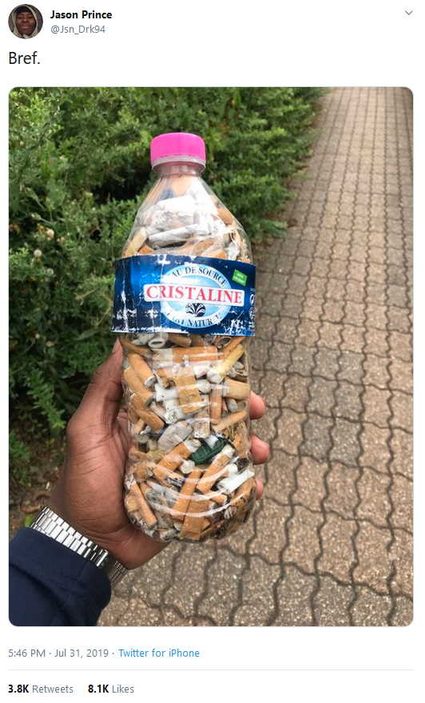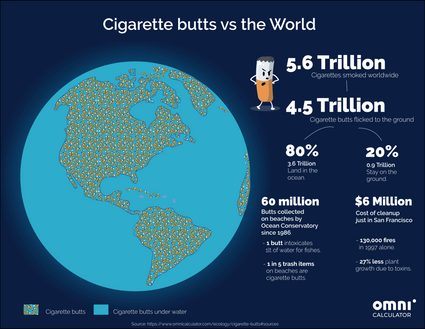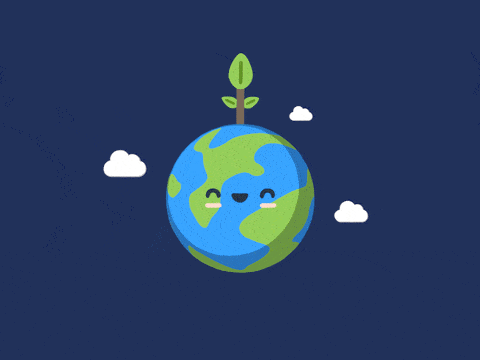Cigarette Butts Cleanup Calculator
Cigarette butts or filters are the most littered item on the planet. An estimated 5.6 trillion cigarettes are smoked each year, out of which two-thirds never make their way to an ashtray. That's 4.5 trillion butts [1] flicked to the ground each year. Because they're so tiny, we tend to believe they're not litter and that this one small cigarette butt doesn't matter.
It does matter, however. The effect of our reckless behavior is startling - there's no other trash item that is so omnipresent in our cities - and in our oceans, too! The Ocean Conservancy [2] has noticed that cigarette butts account for one in every five items found in their annual Coastal Cleanups, which makes them the most littered items in the world.
It's time we do something about it.
On July 31, three French teenagers - Amel Talha, Jason Prince, and Christian Musitu Swamu - started a campaign against cigarette butts. Jason collected cigarette butts in a bottle and posted the picture on Twitter, while Amel launched the hashtag #FillTheBottle. Since then, the hashtag has gone viral, causing hundreds of people to clean up as a protest to the flood of cigarette butt litter.

You can join the movement, too! Our calculator is here to show you what will be the tangible effects of your contribution, whether it's a one-off thing or a regular commitment. So grab a bottle, call a few friends and family members, and organize your own cleanup. You can also commit to regular cleanups of cigarette butts — even twenty minutes a week can make a staggering difference!
Cigarette butts are terrible. Here's why
We're so used to seeing cigarette butts beneath our feet that we hardly ever wonder about the harm they cause. Turns out, no other piece of litter has as many detrimental effects on our environment!
-
First of all, 95% of all filters are made of plastic cellulose acetate, and can take up to 25 years to decompose [3]. During that time, they break into smaller pieces, adding to the problem of microplastic pollution. As much as 1.69 billion pounds of cigarette butts end up as toxic trash each year [1].
-
While a cigarette butt decomposes, it releases a multitude of chemicals and toxins into the environment. These toxins include [benzo[a]pyrene](visit the smog calculator to know more about it), one of the most carcinogenic substances in the world, but also arsenic, lead, cadmium, ammonia, benzene, formaldehyde, nicotine, and even tar. The American Lung Association warns that 69 of the over 7,000 chemicals released from a burned cigarette are carcinogenic, and a lot more are poisonous [4].
-
A study led by Anglia Ruskin University found that if cigarette butts are thrown to the ground, the toxins they release significantly hamper vegetation. Plants germinate 27% less frequently, and they grow to be 28% smaller [5].
-
Some cigarette butts are discarded recklessly in forests and parks, leading to widespread fires. In 1997 alone, this caused over 130,000 fires. Nature is not the only thing that falls victim to them; a smoldering cigarette could have started the Notre Dame fire [6].
Basically, everything is better than cigarette butts. Check out this hilarious video made by :
How much can I clean up?
To help battle all of that pollution, we created this cigarette butts cleanup calculator. It will help you plan your own cleanup initiative and see what the effects of your work will be. There a just a few steps for you to follow:
-
Decide whether you'll be cleaning alone or if you'll get some friends to help. Maybe you could even try to organize a widespread campaign in your neighborhood?
-
Pick your type of cleanup. Is it a one-time thing? Or maybe you plan to commit to cleaning once a week? Twice a month? You'll be surprised how the effects of such a regular effort accumulate over time!
-
Decide how much time you want to dedicate and, in case of a regular cleanup — how often.
-
Choose what kind of area you want to clean. Depending on how polluted it is, you will collect cigarette butts at different speeds. We assume that the speed ranges between 500 butts an hour (that's the ), 375 butts an hour (the case of heavily polluted ), 145 butts an hour (the case of badly polluted ) and 40 butts an hour (moderately polluted ).
-
Pick the container you'll use to collect the butts. We encourage you to put plastic into plastic and collect them into plastic bottles or trash bags. You can also put them in a glass jar. Thanks to the wonderful , we know that 170 cigarette butts occupy a volume of approximately 1 liter.
-
That's it! Now you'll know how many containers you'll fill with the toxic waste and how many butts you're going to collect. Just make sure to wear gloves and never collect the butts with your bare hands! Who knows, maybe you'll be even more effective than Jason Alexander? Watch the footage from BBC, where Jason cleans the Suffolk coast:
Poisoning of oceans and fish
By cleaning up cigarette butt litter, you help to prevent pollution of the oceans that is happening at an astounding pace. Our oceans contribute between 50 to 85 percent of the oxygen in the Earth's atmosphere [7], but we keep dumping the worst we have - plastic straws, bags, and cigarette butts - in its waters. It is assumed that as much as 80 percent of all butts make their way into the seas and oceans [8].
A groundbreaking study on the toxicity of cigarette butts showed that one cigarette butt soaked for 24 hours is enough to make 1 liter of water toxic for both saltwater and freshwater fish [9]. Toxicity is defined as killing half of all the fish exposed to such contaminated water.

Danger to children and pets
Some cigarette butts don't reach the ocean waters, though. In the meantime, they are picked up, and sometimes eaten, by animals. Dogs, cats, and birds often ingest cigarette butts, which can be potentially fatal for them. The other endangered group is children; when they're playing on a beach full of litter, it's not unlikely that cigarette butts will make their way from the sand to their mouths.
According to the Poisoning and Toxicology Handbook by Jerrold B. Leikin and Frank P. Paloucek, the nicotine in cigarettes is so toxic that children who ingest six cigarette butts should be hospitalized. If your child eats a cigarette butt, don't wait until it eats the other five - take them to a doctor!
A study on pets showed that the lethal dose of nicotine in dogs is 9.2 mg/kg [10]. As one cigarette butt contains between 5-7 mg nicotine [11], this means that a dog weighing 50 lbs will be killed if they eat 35 of them. This number is much lower for small puppies and other pets, such as cats and birds. The signs of poisoning, such as vomiting, can be seen after ingesting only one cigarette butt.
Fight causes, not symptoms
Cleaning up cigarette butts are a powerful way to fight pollution - volunteers participating in the Ocean Conservancy Coastal Cleanups have collected a staggering 60 million cigarette butts since 1986 [12]. Still, this is a solution that battles the aftermath of careless littering and doesn't eliminate the root cause. If not done by volunteers, it's also expensive - the city of San Francisco estimated that the total cost of cleaning cigarette litter in the urban area exceeds $6 million [13].
Surprisingly, most cigarette butts are discarded within 10 feet from an ashtray [14]. The widespread acceptance for dropping cigarette butts, along with the "cigarettes are not litter" way of thinking need to change if we want to save our environment from toxic pollution.
How can I make a change?
If you smoke, quit! You can use our calculators to check how much longer you'll live, and how much money you'll save once you quit. Until that moment, make sure to discard every cigarette butt in an ashtray, even if it means carrying it for a few minutes.
Many cities around the world have introduced creative solutions, encouraging smokers to dispose of their cigarette butts in ashtrays. have two openings for filters. Smokers can use their butts to pick their superpower of choice (invisibility or flight), choose the quality most valued in a friend (loyalty or humor), and even guess how much snow will fall this year.
Dutch designers took a different approach: their starts playing a song and flashing lights every time it's "fed" a cigarette butt. Since the songs change every time, people even started picking up butts from the ground to hear a different tune.
And what happens with the butts once they've been collected? We can build roads out of them! It turns out that makes road pavement more resistant to heavy traffic, and adding them to clay bricks reduces the energy needed in brick production.
Sources
- Truth Initiative - .
- Ocean Conservancy - .
- Sea Angels - .
- American Lung Association - .
- Ecotoxicology and Environmental Safety - .
- CNN - .
- EarthSky - .
- GreenPeace - .
- Tobacco Control - .
- Tobacco Control - .
- Poison Control - .
- NBC News - .
- Health Economics Consulting Group - .
- Beachapedia - .
